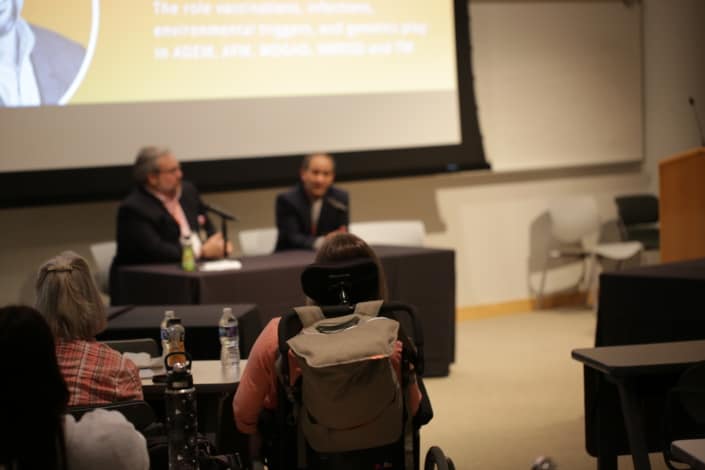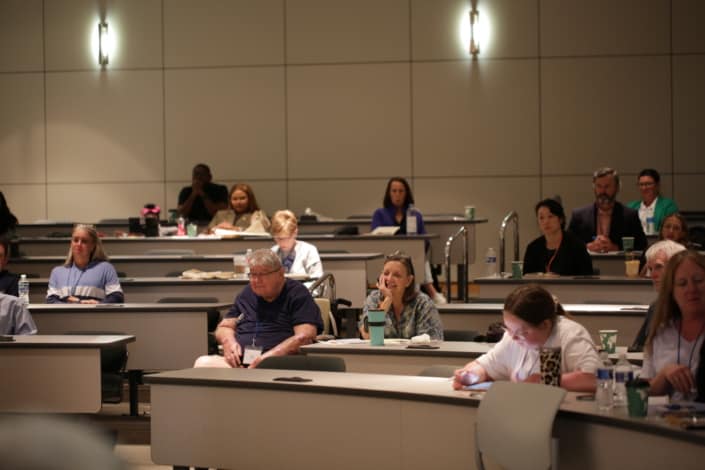Unveiling Insights Into Rare Neuroimmune Disorders at the 2023 RNDS
In early October, we gathered in Dallas, Texas for the 2023 Rare Neuroimmune Disorders Symposium (RNDS), a one-day educational conference held by the Siegel Rare Neuroimmune Association (SRNA) and the University of Texas Southwestern (UTSW). The event brought together individuals diagnosed with rare neuroimmune disorders, their families, caregivers, and medical professionals, shedding light on the complexities of these conditions and the latest developments in their understanding and treatment.
Leah Campbell, SRNA member and volunteer shared about her first Regional RNDS: “I decided to attend the Regional RNDS because it was close to home and I had never attended an RNDS in person before. I wanted to connect with old friends, to make new connections, and to support the rare neuroimmune community. I wanted to learn about the latest research and treatments for rare neuroimmune disorders, and to hear from and talk to the experts in the field.”
The symposium kicked off with a welcome from SRNA President Sandy Siegel. The morning sessions explored controversies in rare neuroimmune disorders, beginning with an exploration of the diagnostic odyssey and overview of ADEM, AFM, MOGAD, NMOSD, and TM. Dr. Benjamin Greenberg and Dr. Michael Levy discussed potential causes of rare neuroimmune disorders. They addressed questions related to vaccinations, infections, environmental triggers, and genetics.
The afternoon sessions focused on symptom management and improving the quality of life for those diagnosed with rare neuroimmune disorders. Breakout sessions addressed rehabilitation and recovery, caregiver support, cognition, depression, and urological management. These discussions aimed to provide practical solutions and strategies for those living with these conditions and their families.
In addition to symptom management, the symposium provided a platform for discussions on the latest research advances. Experts presented updates on new therapeutics, research studies, and opportunities for dialogue and discussion. Topics included neuropathic pain research, clinical trials in MOGAD and NMOSD, AQP4/MOG tolerization research, and an update on a study involving the transplantation of human glial restricted progenitor cells into patients with transverse myelitis.
On November 4th, the SRNA community gathered again – online – for the 2023 Virtual RNDS.
This event included pre-recorded and live presentations for an educational program designed to empower the rare disease community to become better advocates for themselves and find valuable resources to keep learning about these rare conditions. The event brought together individuals diagnosed with rare neuroimmune disorders, their families, caregivers, from across the globe. The program included an open Q&A and breakout sessions. Participants engaged in “networking breaks” throughout the event, where they could video chat one-to-one with other attendees, physicians, and SRNA staff.
During breakout sessions, attendees had the opportunity to join one of four different topic focus areas. A panel of community members included Cyrena Gawuga, Aidan Morse, Maria Cerio, and Leah Campbell with SRNA’s GG deFiebre as moderator to discuss the topic of disability and rare neuroimmune disorders. Cyrena described her recommendations to others in the SRNA community, saying “Don’t be afraid to take up space, however you define that for yourself. A lot of times whether you call yourself a person with a disability or a disabled person, people feel compelled to hide their experiences and hide who they are. I would also say don’t be afraid to affirmatively ask for help – sometimes asking for help can come from a position of power.” Attendees in other sessions learned about self-care and other strategies for caregivers with Paula Hardeman, and psychological and behavioral changes in people who diagnosed with rare neuroimmune disorders with Dr. Lana Harder. In the session on Caring for the Caregivers, Paula Hardeman shared how she approaches caregivers from her personal experience “What I share with all of the caregivers and the patients is: it’s okay to be angry, it’s okay to be mad, it’s okay to be frustrated, it’s okay to be sad, and to allow your body to go through that emotional process and talk about it. Talk about it with your loved ones, with your family, your friends, and if you feel it is needed, you can talk about it with a professional mental health provider.”
If you attended the Virtual RNDS, we would appreciate your feedback about your experience at the symposium and invite you to fill out this survey.
The 2023 RNDS and 2023 Virtual RNDS offered a wealth of knowledge and a space for sharing experiences, mutual support, and forging lasting connections. As the event concluded, attendees left with a deeper understanding of these complex conditions. Leah shared: “I learned that there is a lot of exciting research happening in the field of rare neuroimmune disorders. There is hope for new and better treatments in the future. At the RNDS, you realize that you are not alone in your journey. There is a whole community of people who understand what you are going through and who are here to support you. You can live a full and meaningful life, even with a rare neuroimmune disorder.”
The 2023 Rare Neuroimmune Disorders Symposium series is not over yet! In addition to these two events, we are hosting SRNA’s first Spanish language RNDS on Saturday, December 2. Find more information here. Thank you to Alexion Astrazeneca Rare Disease, Horizon Therapeutics, Genentech, and UCB for supporting the 2023 RNDS series.







